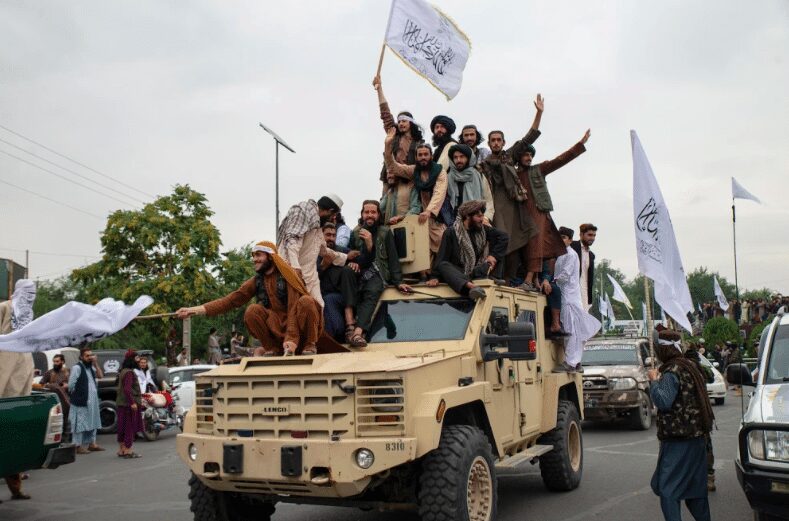A year ago, the Taliban reestablished their hold on power in Afghanistan. 20 years of intense conflict with the United States of America. Will it succeed in pursuing its interests while also navigating the world’s diplomacy?

Taliban is an organisation that adheres to the Deobandi school of Sunni Islam. In Afghanistan, it regained control in 2021. When US troops forced the Taliban from power in 2001, they relocated near the Pakistani border, gradually reclaimed some of Afghanistan’s territory, negotiated a peace agreement with the US government in 2020, and regained control of the country by August 2021.
How did the Taliban come to be?
Taliban was established in the early 1990s by Afghan Mujahideen/Islamic guerilla fighters and young Pashtun tribesmen who were madrasa students in Pakistan, with the support of the Central Intelligence Agency (CIA) with headquarters in the US and the Inter-Services Intelligence (ISI) directorate with headquarters in Pakistan. Taliban was Pashto for “students.” A significant ethnic group along Pakistan’s and Afghanistan’s borders is the Pashtun.
Taliban was established to force the Soviet Union to leave Afghanistan between 1979 and 1989. And this is where the power politics of Afghanistan began to take hold. And it began to acquire popularity in the post-cold war era when various mujahideen factions engaged in a power struggle between 1992 and 1996. In 1994, the Taliban committed to bringing stability and establishing a legal order. From South-West Afghanistan, it seized control of the province of Herat, which bordered Iran. By 1996, it had gained control of Kabul and overthrown the corrupt and anti-Pashtun administration of President Burhanuddin Rabbani.
Afghanistan was designated an Islamic Emirate and Mullah Mohammed Omar was named its ruler in 1996. 90% of Afghanistan was under Taliban control up until 1990. Using the strict Pashtun tribal norms and Sharia Law, the Taliban established a firm grip on Afghanistan. As a result of its adamant stance, it ignored fundamental human rights, particularly those of women, and used to penalize those females who disobeyed the rules by prohibiting them from pursuing formal education or employment. Additionally, they penalized the men only for not sporting a full beard. It used to have the worst possible control over Afghanistan before 2001.

Do the Taliban and Al-Qaeda have a relationship?
The 9/11 attacks by Al-Qaeda on the World Trade Center in New York, USA, in 2001, caught the attention of the entire world, especially the US, on the Taliban. The US accused the Taliban of supporting Osama Bin Laden and Al-Qaeda.
In October 2001, the US oversaw a military action in Afghanistan against the Taliban. By the year’s end of 2001, the Taliban government was overthrown. The United Nations Security Council imposed sanctions, seized their financial resources, and placed a weapons embargo on the Taliban. The top Taliban figures, including Mohammed Omar and the leader of Al-Qaeda, Bin Laden, were airlifted to Pakistan. The Taliban’s alliance strengthened when Lashkar-e-Taiba (LeT), Jaish-e-Mohammed (JeM), and Al-Qaeda joined forces, and they began striking not just in Afghanistan but also in other countries around the world, including India.
Since then, the Taliban and Al-Qaeda have made numerous attacks to seize control of Afghanistan, ultimately succeeding in doing so.
Finances of the Taliban?
The Taliban previously obtained its funding from the illicit opium and poppy trade, as well as other unlawful operations like drug trafficking and extortion. The world’s biggest opium producer was Afghanistan. In addition to this, the Taliban also utilized funds from international organizations.
Although there was a significant impact on income and funding after the 2022 regime shift, leading to a deficit crisis. It currently receives funding from coal exports and customs collection. Since April 2022, it has outlawed the cultivation of poppies.

Who among them all harmed the Taliban?
In addition to other nations, the Islamic State Khorasan (ISK) poses one of the largest dangers to the Taliban. ISK continued to pose a serious threat even after 2021, spearheading multiple strikes on both civilians and Taliban targets. Additionally, they assaulted American soldiers as they were leaving Afghanistan. Through these attacks, they gained not only notoriety but also lucrative cash from Islamic State.
To fight the Taliban’s control, the Afghan people, former officers, and Afghan security personnel founded the National Resistance Front. The group requests assistance from outside powers, especially the US, because it is not powerful enough on its own.

Present circumstances?
The Taliban regime is currently rowing through rough waters. It must uphold the peace agreement it signed with the US in 2020 while also waging a sad ideological war against the rest of the world.
Both are being neglected by the Taliban government. Because of its close ties to Al-Qaeda, LeT, and JeM, it is unable to grant rights to the people it rules over and cannot receive recognition from international parties or countries.
Afghanistan has recently demonstrated a readiness to distance itself from Pakistan and the ISI. Tehreek-i-Taliban Pakistan (TTP), a group that opposes the Pakistani government, is also lending it assistance. Due to the Taliban insurgent attacks on Pakistan and their rejection of the Durand Line, which separated Afghanistan and Pakistan, there is now a rift between Pakistan and the Taliban.
Afghanistan is requesting assistance from India and strengthening connections with it to distance itself from Pakistan and the ISI. India has been a dependable partner to Afghanistan and has helped it by investing in infrastructure and providing humanitarian aid, such as delivering grains, without having any geopolitical ambitions. This gives India a significant advantage over other countries. Taliban is therefore requesting that India renew their relationship by investing in Afghan military training and development once more.
By beginning humanitarian aid and reopening the embassy in Kabul in June 2022 after the Taliban bombed it there in 2008, India has responded very positively. Not only would the Taliban benefit from the improved relations, but India will also benefit from the reduction of terrorism and connectivity problems in Central Asia.
Taliban has not kept their vows to cut relations with Al-Qaeda, the TTP, and other terrorist organisations. It also pledged to renounce its sympathies for the Deobandi gang, which had ties to Pakistan and is ultimately to blame for the attacks in Kashmir that are endangering India’s security.
The question that remains is whether Afghanistan will be able to strike a balance between its ideological and materialistic goals. And can counterterrorism measures serve India’s interests, and will it be prepared to accept their costs and rewards in the short and long terms?
READ MORE
- Diva Alexandra Rosales has been named as Queen Glamour Model International
- PM Modi Inaugurated the Two-Day Kisan Samman Sammelan 2022













